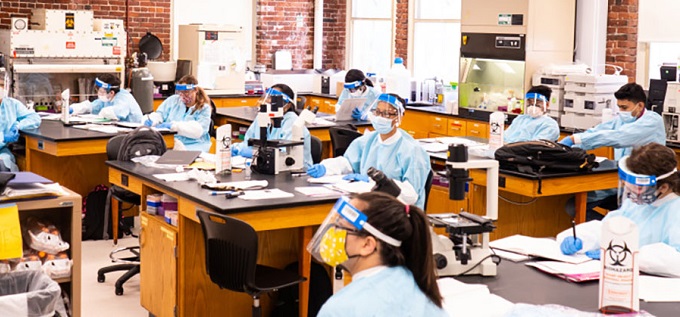Leveling the playing field
October 28, 2021
A new STEM internship program emphasizes equity, access
“Having an internship gives students a risk-free chance to try out new opportunities,” said Julie Pierce Onos, Middlesex Community College’s (MCC’s) director of the Northeast Regional Internship Program (NRIP).
NRIP strives to provide students at the Massachusetts college with access to meaningful internships to help them gain relevant skills and better understand what they want to do in their future careers.
Many students from historically excluded backgrounds do not have the connections or support to get quality internships or jobs, says Pierce Onos. This creates what she refers to as “the cycle of exclusion” – a problem that this internship program seeks to combat.
“We have a really big underpinning of equity and racial justice values in the founding of the program,” Pierce Onos said. “By intentionally targeting and wanting to recruit these students, this will be a pathway to give them these connections. The program will concretely break past those negative cycles and give more people an opportunity to succeed.”
MCC was provided $112,966 in grant funding from The Boston Foundation as part of a regional initiative to increase paid internship offerings for students studying STEM (science, technology, engineering and mathematics) and to diversify the STEM workforce.
A data-driven program, it is the level of research MCC has done that sets the college apart, according to Rebecca Newell, MCC’s associate dean of students. The college – and Pierce Onos in particular – has identified and partnered with employers who are also dedicated to equity.
These partnerships will allow the college to advocate for underrepresented populations, providing new opportunities for students in a supportive environment. “That is really at the core of this program,” Newell said. “Providing those opportunities to students who may not otherwise even know they exist.”
The goal of NRIP is to work with partner companies to identify their needs and match them with qualified MCC students. Pierce Onos has been talking with employers to hear what skills and knowledge they want interns and entry-level employees to know when starting at the company.
Involving faculty
Pierce Onos also has been working with MCC STEM faculty to better understand how to incorporate the employers’ needs into the curriculum to better match what students learn in their certificate and degree programs with their internship experience. Faculty are also being recruited as advisors for the program and will play a big part in helping bring in qualified students.
“In the CAD and Engineering Department at MCC, we teach theory and its application to the industry,” said Marie Tupaj, MCC CAD & engineering professor. “Specifically, we want the skills that we teach to be useful today. Employers are always impressed if a student can start the job running — that is they already have the technical skills to complete the work so they can immediately start focusing on the deliverables.”
Tupaj – who is the LSAMP (Louis Stokes Alliance for Minority Participation) Site Coordinator – wanted to get involved with NRIP to help the scholars she is working with get internship experience. As the hope of NRIP is for employers to consider keeping students on either part- or full-time, Tupaj believes it will look great on their resumes and lead to high paying positions. “It is also great to see a student off to their next step when they are graduating from MCC,” she said.
Starting at Middlesex in the Spring 2022 semester, NRIP will be cohort-based. Students will apply, join and be “intentionally mentored” at the same time, according to Pierce Onos. In addition to a free, one-credit career readiness course, participating students will have access to resume, interview and cover letter workshops. In Summer 2022, the students will start their internship.
“The work they will be assigned will be related to their major, their industry, and it’s going to be substantive,” Pierce Onos said. “They’re going to be doing real work and contributing something real, so they’ll leave with a better understanding of the industry – whether that means they change their major or it sets them up to do this work well in the future.”
Throughout the program, students will be introduced to potential career pathways, build confidence in their field, get childcare and transportation stipends when needed, and receive skill-based job experiences, mentorship, networking connections, and references and recommendations.
Students will also be paid for their efforts. Another way to “level the playing field,” making sure students receive payment for their work “recognizes the value of their work and contribution,” and helps prepare them to be successful long-term, Pierce Onos said.
In turn, partner employers receive access to future employees, reduced recruiting costs, increased visibility in the community and staff productivity, and have the opportunity to test-drive talent, close skill gaps of employees, give back to the community, and foster leadership opportunities.
There’s more to the story! Read the full article here.


